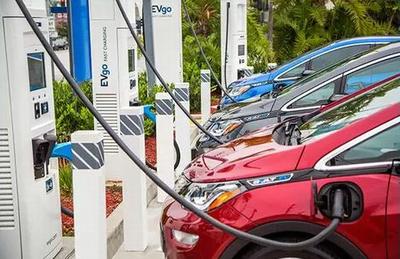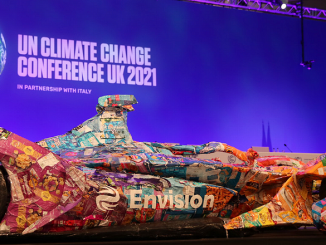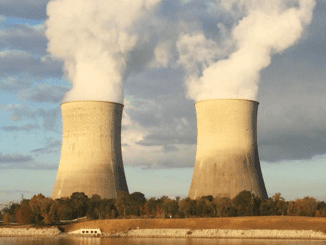
WASHINGTON, DC, March 3, 2021 (ENS) – Six large U.S. utilities have announced a plan to ensure drivers of electric vehicles have access to a seamless network of charging stations connecting major highways in the South, Midwest, Gulf and Central Plains regions of the United States.
The Electric Highway Coalition – made up of private companies American Electric Power, Dominion Energy, Duke Energy, Entergy Corporation, Southern Co., and the federally-owned-and-operated Tennessee Valley Authority – will enable EV drivers to drop range worries and travel across a broad swath of the country powered by a network of DC fast chargers.

This partnership represents an unprecedented effort to offer EV drivers convenient charging across different company boundaries and allow travel without interruptions from Cleveland, Ohio to San Antonio, Texas, from Nashville, Tennessee to St. Petersburg, Florida and many points in between.
“The path to cleaner transportation is a robust charging infrastructure along the nation’s major highways,” said Lang Reynolds, director of electrification strategy for Duke Energy.
“Range anxiety is a barrier to more EV adoption. This coalition can erase those obstacles and help deliver the benefits of EV ownership to consumers,” Reynolds said.
Each company is taking steps to provide EV fast charging options within their service territories to facilitate interstate travel. Charging stations will provide a high-powered fast charging experience as new EV models released on the market are capable of charging at faster and faster speeds.
Sites along major highway routes, with easy highway access and amenities for travelers are being considered first for the installation of new charging stations.
The Edison Electric Institute estimates 18 million electric vehicles will be on U.S. roads by 2030. While many drivers recognize the benefits of driving an EV, such as the ease of low-cost home charging, some are concerned with the availability of charging stations during long road trips.
In February 2021, the U.S. had almost 100,000 charging outlets for plug-in electric vehicles. With almost 32,000, California is the state with the most electric vehicle charging stations and charging outlets in the United States, with Texas ranked second and Florida ranked third, according to Statista.com.
Biden Administration Supports Electric Vehicle Charging

On Tuesday, National Climate Advisor Gina McCarthy, alongside senior staff from the National Economic Council, the Council on Environmental Quality, and Department of Transportation, held a virtual meeting with CEOs from electric vehicle charging companies to discuss shared priorities from tackling the climate crisis to supporting the economic recovery to build back better.
McCarthy underscored President Joe Biden’s commitment to investments that will strengthen domestic supply chains, bolster American manufacturing, create good-paying, union jobs in sectors that support vehicle electrification, and she noted the administration’s goal to build more than 500,000 EV chargers.
Administration officials and EV charging infrastructure leaders discussed “the importance of accelerating the development and deployment of EV charging technologies and infrastructure to empower American workers and manufacturers to win the 21st century,” the White House said in a statement.
To “accelerate and scale a national network of EV charging stations” the officials and EV charging infrastructure leaders agreed it is important to encourage collaboration across the government, automotive industry, and other sectors involved in vehicle electrification as the country “aims to lead the world in a clean energy revolution.”
Electric Highway Coalition Leaders Enthusiastic
Coordinated efforts like the Electric Highway Coalition are intended to demonstrate that electric cars and trucks are a smart choice for traveling long distances as well as driving around town.
Nicholas Akins, chairman, president and chief executive officer of American Electric Power, AEP, said, “With this effort, we are working to help drivers see that EVs fit their lifestyle and their travel plans, wherever the road might take them.”
AEP has committed to replacing its 2,300 cars and light-duty trucks with EV models by 2030. Medium-duty and heavy-duty vehicles will transition to hybrid or electric alternatives as models become available. The charging infrastructure buildout also will enable AEP employees to use EVs to travel throughout the company’s 11-state service territory.
AEP also is working with select customers across its service territory to help them understand the benefits of electrifying their own vehicle fleets or business processes.

For Duke Energy, specific fast-charging station locations will be determined through the course of existing and planned fast charging program deployments. This effort will provide drivers with effective, efficient, and convenient charging options that enable long-distance electric travel.
The collaboration is good timing for Duke Energy, which has already launched programs to expand EV charging both internally at Duke Energy locations and externally through several utility pilot programs. An internal “Electrify By Example” initiative is starting with an effort to install workplace chargers at all work locations to enable employees to drive electric.
In Florida, Duke’s Park and Plug pilot has installed more than 570 EV public charging stations throughout the state. To date, drivers have used the Park and Plug network for over 60,000 charging sessions, displacing more than 90,000 gallons of gasoline.
Regulatory action in 2020 led to pilot programs being approved in both North Carolina and South Carolina. The pilots will lead to full charging for all types of EVs in about 20-30 minutes.
In North Carolina, a $25 million pilot program will lead to the installation of 200 public Level 2 and fast charging stations, more stations at multifamily buildings and a school bus electrification pilot.
In South Carolina, the company will provide up to a total of $1,000 for 400 residential Duke Energy Carolinas customers who install a Level 2 charging station, provide access to their charging data, and manage EV charging load to occur during off-peak periods.
Tennessee Valley Authority President and CEO Jeff Lyash said, “Together, we can power the electric road trip of tomorrow by ensuring seamless travel across a large region of the U.S. This is one of many strategic partnerships that TVA is building to increase the number of electric vehicles to well over 200,000 in the Tennessee Valley by 2028.”
The TVA is a unique government agency in that it is structured like a corporation but has the power of the federal government. It is responsible for supplying power to cities and communities along the Tennessee River, covering some 80,000 square miles in the southeast. It operates fossil fuel, nuclear, and hydropower plants, and helps to maintain the nation’s fifth-largest river system.
Lyash believes that electrifying transportation can spur the same innovative transformation that electrifying the Tennessee Valley did back when the TVA was founded back in May 1933. He said, “EV adoption will spur jobs and economic investment in the region, keep refueling dollars in the local economy, reduce the region’s largest source of carbon emissions, and save drivers and businesses money.”
TVA wants to increase EV adoption in its seven-state service area with a new EV Initiative, which is based on building partnerships with local power companies, state agencies and businesses. TVA is making investments and coordinating partner funding that could bring up to $40 million in programs to support EV adoption over the next five years
The Electric Highway Coalition welcomes other interested utilities to join as it seeks to extend the reach of the network. Additionally, it supports, and looks forward to working with, other regional utility transportation corridor electrification initiatives.

Copyright Environment News Service (ENS) 2021. All rights reserved.



